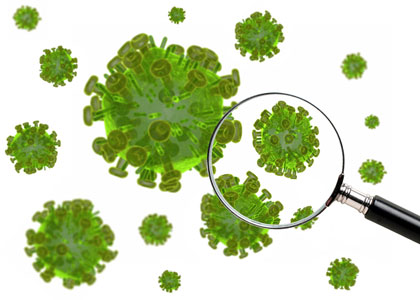
|
Join Us for a Ghoulish Hollywood Fundraising
| Finding A New Class of HIV Drugs
Researchers have uncovered a method for screening an entirely new class of drugs, targeted against the HIV protein Nef, as reported by ScienceDaily. HIV’s Nef protein indirectly influences how well HIV functions in the body. Nef stops HIV-infected cells from signaling to other cells that they are infected. That means that other immune system cells responsible for finding and destroying unhealthy cells aren’t able to respond effectively, allowing HIV-infected cells to keep producing new virus. Nef also activates uninfected CD4 cells nearby, increasing the likelihood that they will also become infected.
Scientists learned long ago that people infected with a
strain of HIV containing a disabled form of Nef typically have much slower
disease progression than people infected with Nef-functional HIV.
Unfortunately, the protein is very difficult to study, because it lacks
biochemical activity that can be directly measured. Now, researchers from the University of Pittsburgh School of Medicine have found a way to measure the effect of drugs on Nef. They do it by coupling it to a cellular protein that Nef activates in HIV infected cells, called Hck, because Hck activity can be easily measured. The research team developed an automated screening tool to test the effect of various chemical compounds on Nef-depending Hck activation, providing a direct readout of Nef activity in vitro.
After testing thousands of compounds, they found three that appear to disable Nef and suppress HIV replication. One, in particular, was able to completely stop all HIV replication in test tubes.
|
A "Valentine" to ARA Researchers
 The event - with entertainment provided by Momma and food and beverage provided by - raised thousands for AIDS Research Alliance.
Next Effort!
Now Steve Valentine is bringing a new promotion to Southern California. Offering Gay Ballroom Dancing classes for couples and singles, European/World Champion and award winning Instructor Robert Tristan will teach students a wide variety of ballroom dances, including the WALTZ, RUMBA, and TANGO. http://www.gayballroom.tv/ The classes will be held in West Hollywood and are for all levels. Mention AIDS Research Alliance when you registar, and The Valentine Group will donate 10% of your registration fee to AIDS Research Alliance. To learn more, click here.    |
|
Have You Heard? "HIV Reservoir"
Picture that clever virus taking refuge from your anti-HIV drugs, and you’ll understand this term. HIV drugs only attack HIV-infected cells that are actively replicating. But the drugs can’t hit HIV in resting immune cells. So the meds can’t clear the virus from our bodies.
“HIV Reservoir” entered our vocabulary when researchers began trying to lure the lurking virus from its hideaways so the drugs could attack it. The hideout is dubbed the Reservoirs by researchers like ARA who are looking for strategies for viral eradication.
You’ll hear the term more frequently; along with others like "HIV Sanctuary" and "Hideout." Last June, scientists showed just how these reservoirs keep HIV going, given us more information to create strategies to coax HIV from its hiding places without upping immune activity.
You will be able to read more about HIV Reservoirs in the upcoming issue of Searchlight Express, due out November 7th. |
|



